Revealed: First images of DOUBLE suicide capsule to be used to euthanize British couple – as Swiss company behind it reveals a quarter of people on its waiting list are British
The first pictures of the double suicide capsule that will be used to euthanise a British couple have been revealed by the company behind the controversial new device.
Peter and Christine Scott, who have been married for 46 years, told the Mail this week they made the decision to end their lives simultaneously in the pod after former nurse Christine was diagnosed with early-stage vascular dementia.
The 80-year-old woman and her 86-year-old husband, who have six grandchildren, are expected to be the first couple to die thanks to The Last Resort, a Swiss organization that offers euthanasia at Sarco, which was founded in July.
The two-person capsule will be built using a 3D printer and will have one or two buttons that the occupants can press to kill themselves. The capsule could be ready for use as early as January.
The solo capsule, which has already been built by the company, has not yet been used after a planned euthanasia fell through in July. The first ‘resident’ is expected to die in the machine soon.
Peter and Christine Scott told the Mail this week that they have made the decision to end their lives simultaneously

The couple will die in the Sarco, a euthanasia pod unveiled in July by The Last Resort, a Swiss organization
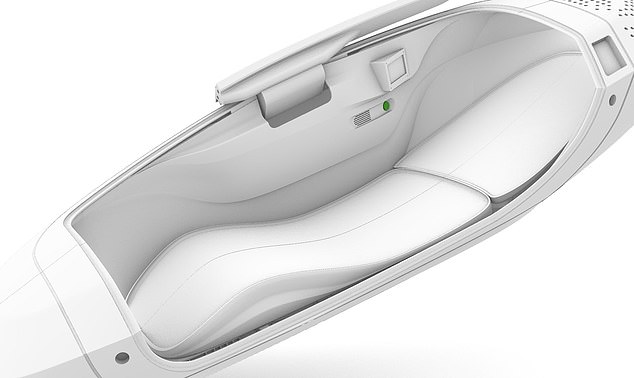
The pod works by replacing air with 100 percent nitrogen, causing the occupant to become unconscious and unable to breathe within minutes. The inside of the double pod will be very similar to the inside of this regular single Sarco
The pod works by replacing the air with 100 percent nitrogen, rendering the occupant unconscious and unable to breathe within minutes, according to Philip Nitschke, the inventor who has been called Dr. Death.
According to The Last Resort, the Scotts are among about 120 applicants hoping to use the machine to end their lives. About a quarter of those on the waiting list are British.
Euthanasia is illegal in the UK and the couple said this week they wanted to share their story to help make the case for it to be legal.
Peter, a former RAF engineer, is currently working on the application and says he has concerns about Christine being allowed to use the machine because arranging assisted dying is more difficult for people with dementia than for those with other conditions.
According to Fiona Stewart of The Last Resort, Christina’s diagnosis a few weeks ago means the couple may need to seek assisted suicide sooner, as she may no longer be able to consent to euthanasia.
She said the couple had to undergo a “rigorous and rigorous” psychiatric assessment before being allowed to use the pod.
The couple have said that they want to die in each other’s arms after a long and happy marriage, a wish shared by many committed couples.
According to Stewart, there are a number of other couples in the process of submitting applications for Sarco, despite the double pod still being in the design phase.
Earlier this year, Dutch Prime Minister Dries van Agt and his wife Eugenie, both 93, died hand in hand by euthanasia.
In the Netherlands, the number of couples choosing joint euthanasia has increased in recent years. It is, together with Belgium, the first country to legalize voluntary death with the assistance of a doctor in 2002.
Strict conditions must be adhered to by both parties, making it extremely rare. However, the latest official figures show an increase from nine couples dying this way in 2018 to 29 in 2022.
“I think there’s a trend toward more couples because people are living longer, healthier lives,” Stewart said.
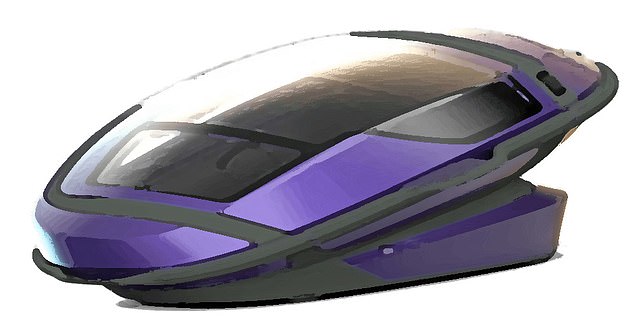
The double pod is noticeably more compact and wider than the original
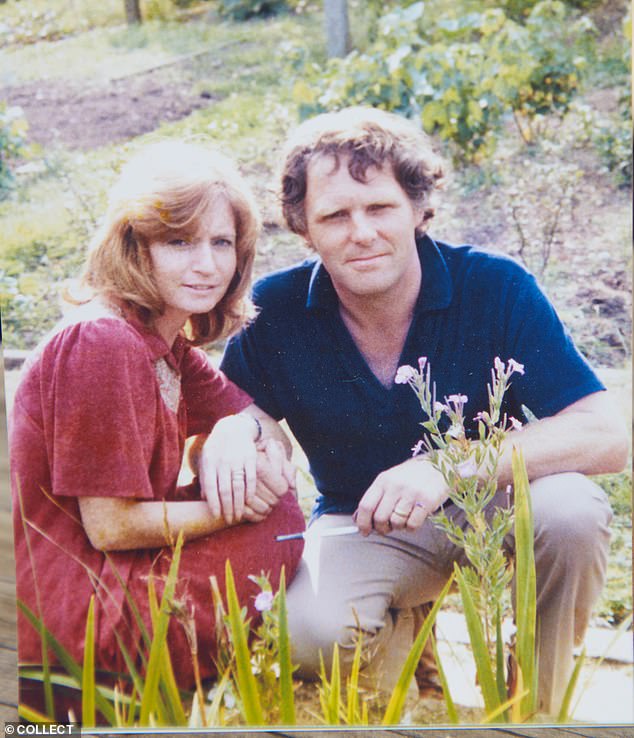
The husband and wife have said they want to die in each other’s arms after a long and happy marriage of 46 years
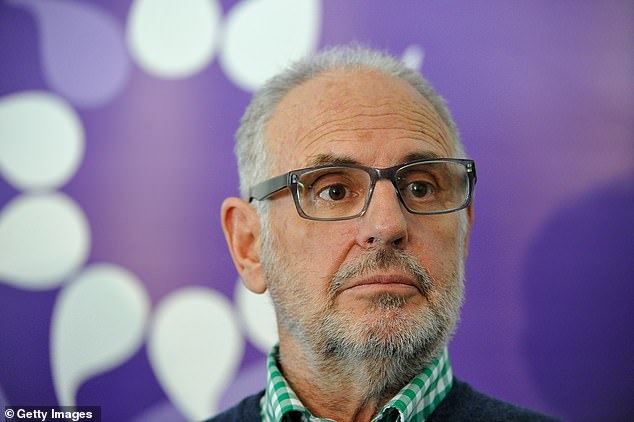
Australian euthanasia advocate Philip Nitschke (pictured), also known as ‘Dr Death’, is a former physician and the inventor of the pod
“They’re more likely to be married for a longer period of time now than in previous generations, when you died out in the 1960s.”
She said it is harder for couples to get euthanasia in Switzerland because there are more obstacles for couples than for individuals. “Because it has to be established that they both want to die individually, but that they also want to die together with the other and that the other does not put pressure on them.”
“We have to make sure that they both have the capacity. We have to make sure that they both act voluntarily. It’s not impossible, but we have to make sure that it’s absolutely crystal clear to work within the boundaries of Swiss law.”
Stewart said that after a full psychiatric assessment, she is “not too concerned that people will change their minds once they’re in” the Sarco.
‘I think once you get into the Sarco – even though there’s a lever on it and you can open the door at any time – you only get permission from psychiatrists who are fully registered and know what they’re doing.
‘We can’t estimate that they wouldn’t have regrets. But it would clearly be better if one of them did have regrets, then they do that before they end up in the Sarco. But that’s why the role of the psychiatric profession is so important.’
The Australian euthanasia advocate, who is a lawyer by training, said she believes the crisis in the NHS and social care is playing a role in the number of Britons considering euthanasia.
“I mean, I think everyone is worried about the NHS. You know, there’s hardly a night that goes by that it’s not in the British news in some way,” she said.
But, she said, “it goes beyond just health care, it’s the fear of not being able to take care of yourself.
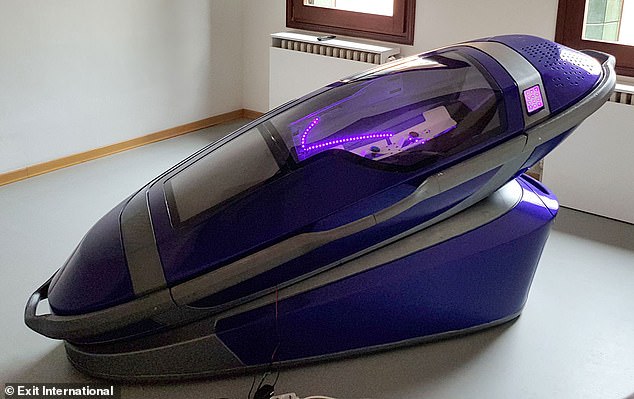
An early version of the Sarco Pod, which can be operated internally and works by reducing oxygen levels
‘I think we need to create the space for a public debate where people can say, “I don’t want to go to a nursing home. I’d rather die than go to a nursing home.” And we need to treat that opinion as if it’s a rational, legitimate opinion to have.
“You know, some people think they’re not going to like living in a nursing home, and then it turns out it’s great. But it’s not the same for everyone.”
Christina and Peter shared their fears about years of health insurance and their concerns about losing their home and savings to pay for care during an emotional family gathering with their son and daughter.
Their shocked children eventually said they would respect their wishes, the couple told the Mail on Sunday.
Stewart praised the way the couple broke the news to their loved ones, saying, “I think they’re a great example of how families can commit to the future.
‘Because this is the beginning of a trend of being very old and not ill, or getting ill and not being able to get help, of dying, even if the UK introduces a law. And I think they are really the tip of the iceberg.’
This is what anti-euthanasia activists fear: that if people are given the option to end their lives, the number of people who choose to do so will increase dramatically, when they could be better cared for at the end of their lives with palliative or other care.
Dr Gordon Macdonald, CEO of anti-euthanasia group Care Not Killing, called it “shocking” that a couple “feel they have no choice but to end their lives in a gas chamber because they do not believe they will get the care they need from an NHS in crisis.”
Campaigners claim that elderly people choose euthanasia because they fear they will become a ‘burden’ to their families.
Dr Macdonald added: ‘That’s why the safest law is the one we have now and why the government should be focusing on fixing our broken palliative care system. It’s a system that leaves as many as one in four Britons who could benefit from this kind of care unable to access it, leading to these terribly sad cases.’
- For confidential support, call the Samaritans on 116123 or visit your local Samaritans branch. For more information, visit www.samaritans.org.
